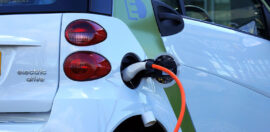SPOTLIGHT: Bright Sparks Solves E-Waste Problem
9 September 2015 at 11:02 am
Australian households are full of electric appliances that were headed straight to landfill at the end of their life until a rescue project stepped in, writes Ellie Cooper in this week’s Spotlight on Social Enterprise.
Bright Sparks, a Melbourne social enterprise, launched last month with the vision to end e-waste in Australia by giving electronic devices a new life.
“We rescue small appliances so they don’t end up in landfill. So rescue could mean reuse, it could mean repair. And for things that can’t be reused or repaired we also do a bit of recycling,” Bright Sparks Founder, Erin Lewis-Fitzgerald said.
While there are no exact figures on electrical waste, Lewis-Fitzgerald said the estimates alone are staggering.
“Last year Australian individuals discarded 468,000 tonnes of e-waste, but I’ve seen reports that say twice that much, I’ve seen a million tonnes – and that’s just the household stuff,” she said.
“The average Melbourne household has 23 electrical and electronic items, not including white goods, and it’s more if you have kids. The national average is 22 items in the household.”
Erin Lewis-Fitzgerald was inspired by the original Bright Sparks in London, which she said highlighted the gap in Australian recycling.
“I saw a video about them and thought it was amazing and thought, oh gosh I wish we had that in Melbourne. But I didn’t think I was actually going to start it myself,” she said.
“But we don’t have many facilities to collect electrical or electronic stuff that’s dead or unwanted.
“And so the reason I got so excited about it when I saw the video is because I thought, yeah why don’t we have that, why doesn’t that exist. It makes so much sense.”
It took a year from seeing the video about London’s Bright Sparks for Lewis-Fitzgerald, with no prior business experience, to decide to start a local version.
She went through Social Traders’ The Crunch program, performing market research and creating business plans, and applied for grant funding during this time.
“It took a while for the funding to come through, but it did, and we are running a pilot program right now through to March,” she said.
“We have funding from the State Government and we also have five local councils [Moreland, Yarra, Darebin, Whittlesea and Boroondara] who have chipped in funds and support to make the pilot happen.”
In August the Bright Sparks team opened the doors of their workshop in Hadfield in Melbourne’s north.
“In our first two weeks, we still don’t have the exact figures, but I would say we probably received around 200 donated items,” Lewis-Fitzgerald said.
“We’ve had eight repair customers and we’ve had heaps of people sign up to volunteer. I get fan mail every day which is awesome.”
During September, the enterprise will begin selling repaired appliances. Lewis-Fitzgerald said volunteers, overseen by a qualified electrician, test donated goods before their new direction is decided.

“If the item is working, let’s just say someone is clearing out their house and they have too much stuff, which is most of what we got in the first two weeks, then we would make sure that it still works. We would do a function test. If it’s a toaster we put bread in it,” she said.
“We test and tag and either sell that back to the public or we would donate it to people in need. If the item is broken, if we have time we might fix it. Or if we have heaps of them or it’s not worth fixing then we will dismantle them and recycle them.”
Lewis-Fitzgerald believes Bright Sparks can be financially sustainable, “but not by March, that would be a huge task”.
The social enterprise ran a successful crowdfunding campaign to extend their pilot until April 2016.
“We’re applying for funding to cover the operating deficit for the first two to three years, because it’s not an instant thing. You don’t just get customers and get the word out straight away,” Lewis-Fitzgerald said.
“But that’s the million dollar question, that’s what everyone wants to know. And we can get there, it’s just not going to be quick.”
However, Lewis-Fitzgerald said the business model will not rely on selling second-hand appliances or making repairs.
“That’s never going to cover wages and rent, so the main business model is the collection of appliances from those bins, so that could be council customers or corporates,” she said.
“Starting next month we’re going to have collection bins in each of the five partnering council areas that chipped in funding with the grant.
“We’ve got a driver who goes around once a week and will be collecting from those donation bins and bringing them back to the workshop and then we’ll collect data on them.”

Data collection on Australia’s e-waste will also form a significant part of Bright Sparks’ social impact.
“Every single item we get at the workshop we enter into a database and we know where it’s come from, what shape it was in, where it’s going because we ask all the customers, what’s your postcode and all kinds of details,” Lewis-Fitzgerald said.
“If we get, for example, 500 toasters and they all have the same fault, or we try to repair a number of appliances and we can’t even dismantle them because they’re designed so poorly, then we’ve got all that information and we can use that later.
“Right now nobody’s collecting it so we don’t know how big the problem is.”
Lewis-Fitzgerald said the councils or corporations who subscribe to the collection service will receive detailed reports about waste from the area, as well as comparisons with other councils or corporates.
“But we can use that information too. We’ve got a long-term plan to get the laws changed so manufacturers have to take responsibility for all electrical items when they die,” she said.
“Right now there’s only legislation in Australia for televisions, computers and mobile phones, so there’s no financial incentive for most places to actually take everything else and that’s what we’re dealing with.
“We want to get the law changed so that there is some kind of incentive for this stuff to get collected and we can make sure more of it does get collected, whether that’s by us or someone else.”
While Lewis-Fitzgerald said she doesn’t know exactly what Bright Sparks will look like in five years’ time she had a lot of budding business ideas.
“Once we’re permanent, once we’re past the pilot and we’ve got enough funding to keep going, one of the things I would like to do is start an appliance library, so people can hire things rather than having to buy them,” she said.
“We’ve have awesome retro kitchen mixers and power tools and karaoke machines. Someone just donated an Atari 2600 [game console] which was like the greatest day of my life I was so excited.
“Also holding repair classes, there might be an opportunity for that, maybe furniture or clothing repairs which is what my background is in.
She would also like to pair up with other businesses or social enterprises who work in repairs and up-cycling.
“One of my not-so-secret dreams is a place called ‘repair town’ where you could go in Melbourne and there would be a bunch of like-minded businesses where you could bring pretty much anything that’s broken and know there will be someone skilled and cheerful who can fix it for you.”
Lewis-Fitzgerald said it’s important to make sustainability enticing to get people on board.
“I want our customers to have fun, and the workshop is a little bit quirky. We have flying toasters hanging in the workshop and there’s a few little funny touches,” she said.
“I didn’t want it to be a dusty workshop… we’ve had the most interesting conversations with most of the people who’ve come by, and they’re the loveliest people I’ve ever met. And it’s more like having a chat with your neighbour than it is visiting a business.”







